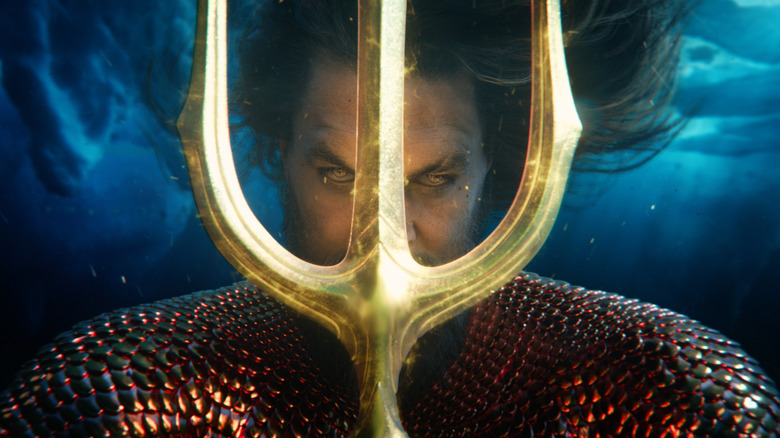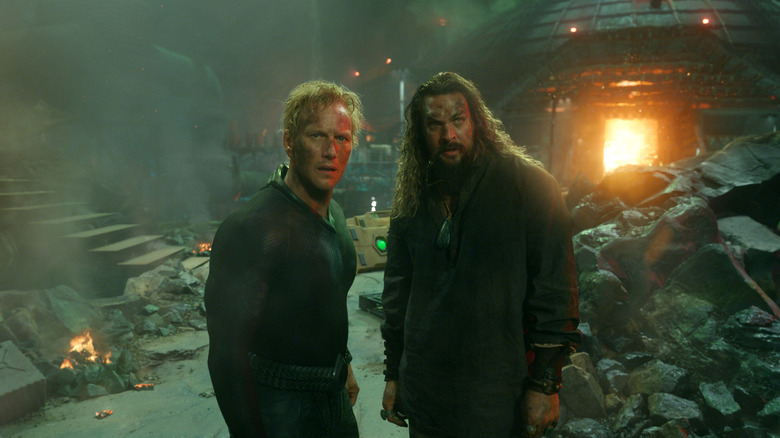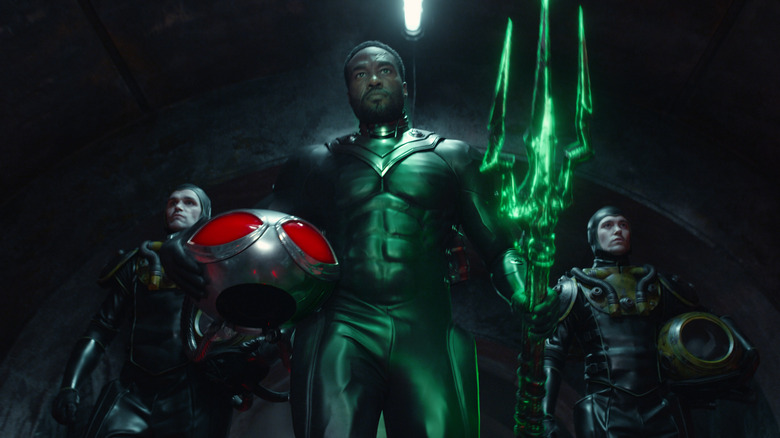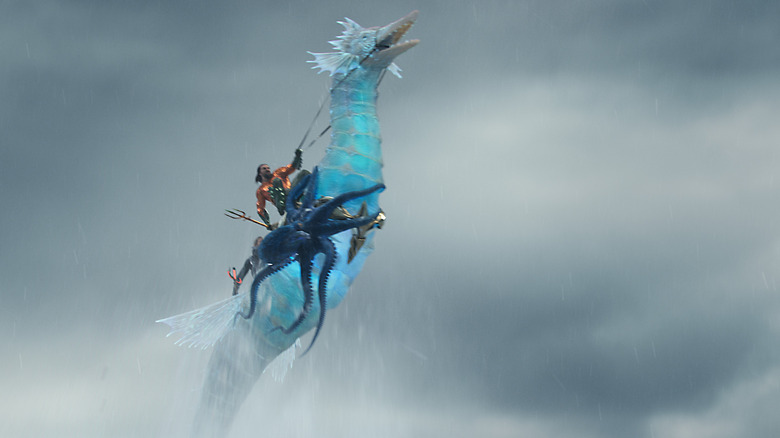Why Aquaman And The Lost Kingdom Bombed At The Box Office
"Aquaman and the Lost Kingdom" looks to be another box office disaster for DC.
The DCEU has finally come to an end, wrapping up a decade-long chapter that never truly took off. From the so-called "Snyderverse" to Dwayne Johnson's obsession with changing the hierarchy of power, the franchise was filled with soaring highs and brutal lows. Now, with the long-gestating "Aquaman" sequel, the franchise is done — calling it curtains to make way for James Gunn's new and improved interconnected universe. And in true DC fashion, "Aquaman and the Lost Kingdom" opened the only way it could: abysmally.
Released with little to no fanfare, James Wan's "The Lost Kingdom" opened to $27.6 million with a 3-day weekend, according to Deadline. That number, which includes Thursday previews, is a significant drop from the $67 million opening weekend haul the first "Aquaman" received in 2018. With a 3-day $27 million opening, "Aquaman and the Lost Kingdom" boasts the second-lowest opening for a DC film, coming in just behind the disastrous $25 million haul of "Blue Beetle."
Deadline estimates that, over the 4-day weekend, the Wan-directed sequel will rake in between $38 and $39 million — a far cry from its predecessor's opening. This is no doubt a disappointment for DC, considering "Aquaman" is the franchise's highest-grossing flick, with receipts totaling a whopping $1.14 billion. Beyond that, this is DC's fourth bomb this year, leaving the franchise's future profitability in doubt, even with Gunn in charge. With a budget north of $200 million, "The Lost Kingdom" will likely fail to turn a profit.
Thanks to growing superhero fatigue, controversy surrounding the film, and just general indifference, "Aquaman and the Lost Kingdom" is the latest causality at the box office, and it remains to be seen if DC can ever recover.
Superhero fatigue can no longer be escaped
"Superhero fatigue" is a buzzword that's consistently thrown around to signal that audiences are fed up with superhero-centric blockbusters. And for a while, it seemed like superhero fatigue was more of a DC issue, as Marvel's films continued to prosper, even after the release of "Avengers: Endgame." However, over the last year, the amount of superhero-related content has exploded, creating indifference among audiences.
The DCEU technically hasn't had a major hit since 2018's billion-dollar-grossing "Aquaman," which boasted stellar legs thanks to the holiday season and a $300 million posting from China. The franchise has released back-to-back bombs since then, with three others this year in the form of "Shazam! Fury of the Gods," "The Flash," and "Blue Beetle." But those "Endgame" glory days are over as not even Marvel Studios is safe — they recently suffered a significant loss with "The Marvels," which rounded out its theatrical run with a $200 million total.
The proof is in the financial pudding: audiences are slowly growing disinterested in superhero-related projects, and "Aquaman and the Lost Kingdom" is the latest causality in this viewership assault. Overexposure is no doubt leading to a lack of financial prosperity — no superhero film has crossed the $1 billion barrier since 2021's "Spider-Man: No Way Home." Have audiences become inundated with too much superhero content, both on streaming and in multiplexes? Or is this a bad movie issue?
Aquaman and the Lost Kingdom is a critical dud
The first "Aquaman" is far from a tour de force — it has a modest 66% on Rotten Tomatoes, a serviceable grade for a large-scale blockbuster. Despite its critical missteps, the film clicked with audiences, thanks in part to Jason Momoa's infectious personality, which was a highlight even in the theatrical cut of "Justice League." Beyond that, James Wan did the impossible by showing Atlantis in its full underwater glory, transporting audiences to an aquatic world rich with visual flair and iconography.
Released during peak superhero mania, the first "Aquaman" offered something new and it was warmly embraced by hardcore fans and casual viewers alike, bringing home an extremely solid A- CinemaScore. In short, the picture was a crowd-pleaser, something "The Lost Kingdom" isn't. Wan's second trip to Atlantis feels disjointed, awkward, and seems to lack a sense of momentum, which is probably why Warner Bros. didn't lift the review embargo until hours before the film's release. Looper critic Alistair Ryder lambasted the film for being... average, writing, "This generic but largely functional tale suffers due to everybody onscreen clearly assuming this is the end of the road, all resigned to failure even as they're shooting it."
For critics, across the board, "Aquaman and the Lost Kingdom" feels like a film that's simply going through the motions, offering nothing new or engaging. On Rotten Tomatoes, at press time, the film boasts a meager 36% with critics.
Aquaman can't escape the negative chatter
Prior to its release, "Aquaman and the Lost Kingdom" was mired in controversy. From the drama surrounding Amber Heard and Johnny Depp to reports that Jason Momoa allegedly appeared drunk on set, James Wan's latest film was riddled with bad press that simply couldn't be ignored. A negative narrative manifested around the picture, which no doubt seeped into the minds of fans. Coupled with the confirmation that "The Lost Kingdom" was going to be the last flick in the DCEU, it felt useless for audiences to show up for what was essentially an unceremonious end.
While the behind-the-scenes happenings on the sequel are best left to speculation, Wan felt compelled to open up about how the negative chatter surrounding the picture was overwhelming — and untruthful. "I've had to learn to be more Zen in dealing with all the noise around me, for sure," Wan told Empire months before the film hit multiplexes. "... [I]t's difficult because this narrative has emerged that is not the reality. The noise is fun to write about, and it gets clicks, but people don't know the truth," the director added.
And by the time the picture was about to be released, it seemed like everyone had given up. From not receiving a red carpet premiere, to Momoa explicitly telling Entertainment Tonight that Aquaman's future is "not looking too good," it appeared as if "Aquaman and the Lost Kingdom" was dead on arrival — and the receipts absolutely prove it.
How far can Aquaman go?
Jason Momoa knows that the DCEU is over. Warner Bros. is ready to move on to another DC chapter. And audiences simply don't care. As the holiday season continues to unravel, audiences will likely continue to ignore "Aquaman and the Lost Kingdom," instead choosing to take their families to the crowd-pleasing "Wonka," the family-friendly animation pic "Migration," or the raunchy rom-com "Anyone but You."
Viewers interested in international fare are showing up in droves for the Indian films "Dunki" and "Salaar," as well as the Japanese pic "Godzilla Minus One," all three of which rounded out the top ten this weekend. While "The Lost Kingdom" did take the number one spot at the box office, it's difficult to imagine the film touching $100 million domestically, with James Wan and Momoa's latest likely disappearing from cinemas in a matter of weeks.
Internationally, the sequel did below average, raking in $80 million, with $30 million coming from China, a stark contrast from its success in the country in 2018. With a worldwide average of just under $110 million with the 3-day weekend, "The Lost Kingdom" is a bitter and disappointing end for the DCEU. The best-case scenario is that the film pushes the $250 million barrier globally, a number it'll probably reach thanks to the holidays. But this one won't have those stellar legs, because the product simply isn't as compelling as its predecessor.
Now, all eyes are on James Gunn and Peter Safran's take on the world of DC, which will formally kick off with 2025's "Superman: Legacy." With no DC flicks set to hit cinemas until then, here's hoping that audiences will miss their quarterly dose of superhero theatrics and openly embrace the new regime.




